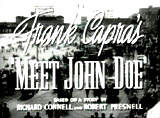
|
Meet John
Doe (1941)
In Frank Capra's populist melodramatic tale about
the common man:
- the typing of a column by struggling, sassy newspaper
columnist Ann Mitchell (Barbara Stanwyck) who saved her job by
fabricating a letter from a typical 'John Doe' character (a "disgusted
American citizen") protesting unemployment, hypocrisy, greed,
inhumanity and other injustices suffered by the nation's poor on
account of big business tycoons, corrupt moguls and slimy politicians
("Dear Miss Mitchell: Four years ago, I was fired out of my
job. Since then, I haven't been able to get another one. At first,
I was sore at the state administration because it's on account
of the slimy politics here. We have all this unemployment. But
in looking around, it seems the whole world is goin' to pot. So
in protest, I'm goin' to commit suicide by jumping off the City
Hall roof") - to protest, he threatened to commit suicide
on Christmas Eve by jumping from the roof of City Hall
- the scene of the selection of plain-speaking, homeless,
ex-ball player and hobo "Long John" Willoughby (Gary Cooper)
to play the part of 'John Doe': (Ann: "He's perfect, a baseball
player. What could be more American?...that face is wonderful. They'll
believe him...That's our man, he's made-to-order")
- the warning of Willoughby's vagrant, anti-social tramp
companion, simply named "The Colonel" (Walter Brennan),
that he would become corrupted by wealth and turn into a heel or "heelot":
("You're walkin' along, not a nickel in your jeans, you're free
as the wind. Nobody bothers ya. Hundreds of people pass you by in
every line of business. Shoes, hats, automobiles, radios, furniture,
everything, and they're all nice loveable people. And they let you
alone. Is that right? Then you get ahold of some dough and what happens?
All those nice, sweet, lovable people become heelots. A lotta heels!
They begin creepin' up on ya, tryin' to sell ya something. They get
long claws and they get a stranglehold on ya and ya squirm and ya
duck and ya holler and ya try to push 'em away, but you haven't got
a chance. They've got ya. The first thing you know, you own things
- a car, for instance. Now your whole life is messed up with a lot
more stuff. You get license fees and number plates and gas and oil
and taxes and insurance and identification cards and letters and
bills and flat tires and dents and traffic tickets and motorcycle
cops and courtrooms and lawyers and fines - and a million and one
other things! And what happens? You're not the free and happy guy
you used to be. You've gotta have money to pay for all those things.
So you go after what the other fella's got. And there you are - you're
a heelot yourself")
- the scene of John Doe's 15-minute radio speech in
which he spoke of his faith in the essential goodness of the common
man and promoted brotherly love with one's neighbor: ("...There's
something swell about the spirit of Christmas, to see what it does
to people, all kinds of people. Now why can't that spirit, that same
warm Christmas spirit last the whole year round? Gosh, if it ever
did, if each and every John Doe would make that spirit last 365 days
out of the year - we'd develop such a strength, we'd create such
a tidal wave of good will that no human force could stand against
it. Yes sir, my friends, the meek can only inherit the earth when
the John Does start loving their neighbors. You'd better start right
now. Don't wait till the game is called on account of darkness. Wake
up, John Doe, you're the hope of the world")
- John Doe's defense of the John Doe Movement, even
after finding out about the scheming chicanery of right wing tycoon
and financier-publisher D. B. Norton (Edward Arnold) to exploit it
for votes: ("Why, this is the one worthwhile thing that's come
along. People are finally finding out that the guy next door isn't
a bad egg. That's simple, isn't it?...It may be the one thing capable
of saving this cock-eyed world. Yet you sit back there on your fat
hulks and tell me you'll kill it if you can't use it. Well, you go
ahead and try. You couldn't do it in a million years with all your
radio stations and all your power, because it's bigger than whether
I'm a fake, it's bigger than your ambitions, and it's bigger than
all the bracelets and fur coats in the world")
- the scene of John Doe's public humiliation at a rainy
political convention by D. B. Norton's dictatorial, anti-democratic
intentions - Doe was pulled from the microphone, accused of being
part of the "cheap racket...for the sole purpose of collecting
dues from John Does all over the country," and revealed to be
an imposter-fraud
- the scene of John Doe's threat to jump off City
Hall on a snowy and cold Christmas Eve when Ann hysterically sobbed
and urgently begged him not to kill himself - and admitted her love
for him: ("Well, you don't have to die to keep the John Doe
idea alive. Someone already died for that once. The first John Doe.
And he's kept that idea alive for nearly 2,000 years. It was He who
kept it alive in them. And He'll go on keeping it alive for ever
and always - for every John Doe movement these men kill, a new one
will be born. That's why those bells are ringing, John. They're calling
to us, not to give up but to keep on fighting, to keep on pitching.
Oh, don't you see darling? This is no time to give up. You and I,
John, we...Oh, no, no, John. If you die, I want to die too. Oh, oh,
I love you. Oh, John..")
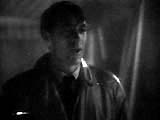
|
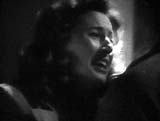
|
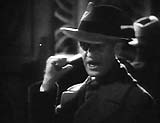
|
|
'John Doe' Threatening Suicide
|
Ann's Declaration of Love for 'John Doe'
|
"There you are, Norton! The People! Try and
lick that!"
|
- the upbeat conclusion in which John Doe walked
away from the ledge toward his supporters carrying an unconscious
Ann in his arms, after the John Doe club members had renewed their
faith in him, and Ann's managing editor Henry Connell (James Gleason)
with his fist told off the oppressive and evil Norton in the final
line: ("There you are, Norton! The people! Try and lick that!")
after John had decided to not commit suicide - with the finale
accompanied by Beethoven's Ninth Symphony
|
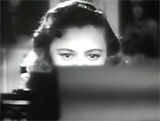
Columnist Ann Mitchell Fabricating Fictitious Character
of 'John Doe'

"Long John" Willoughby (Gary Cooper) Exploited
To Play the Part of 'John Doe'

Tramp Companion: "The Colonel" (Walter
Brennan)

John Doe Clubs
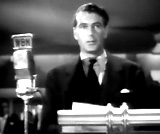
Delivery of 'John Doe's' Radio Speech
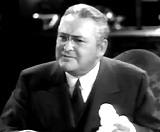
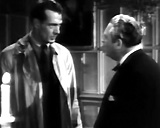
Treacherous and Scheming Politician D. B. Norton
(Edward Arnold)
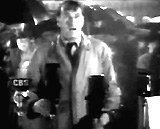
'John Doe's' Public Humiliation in Rain at Convention
|









